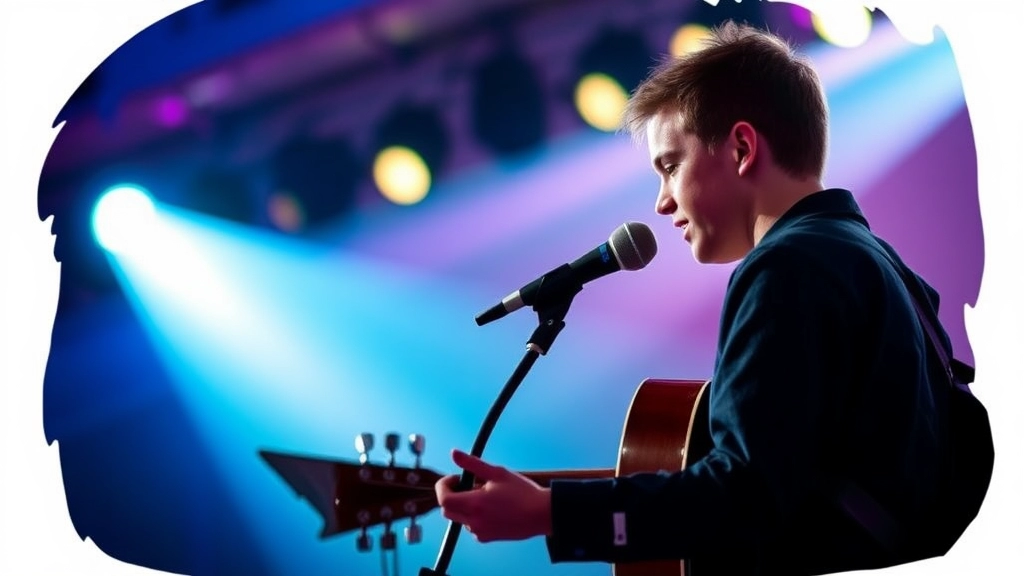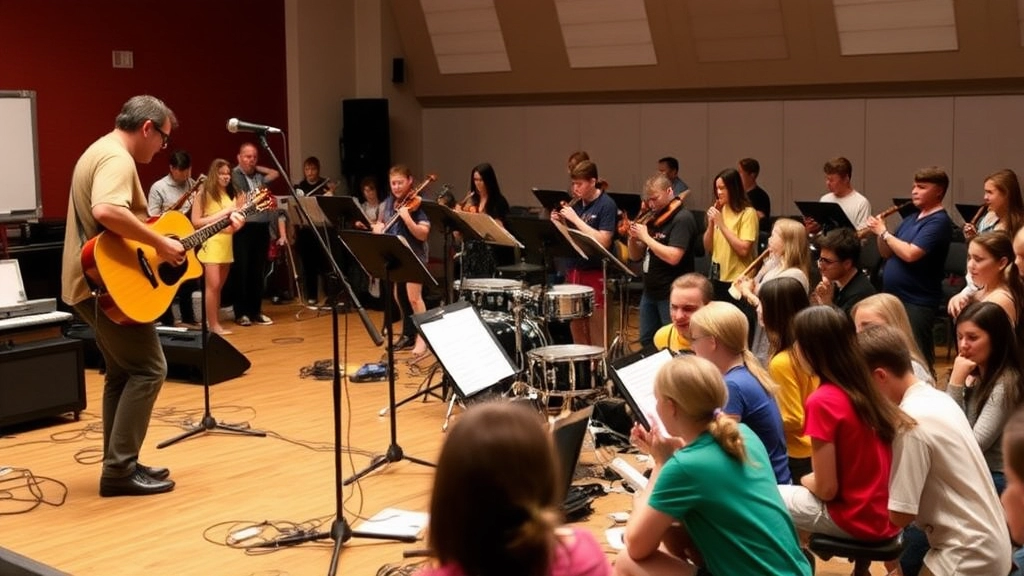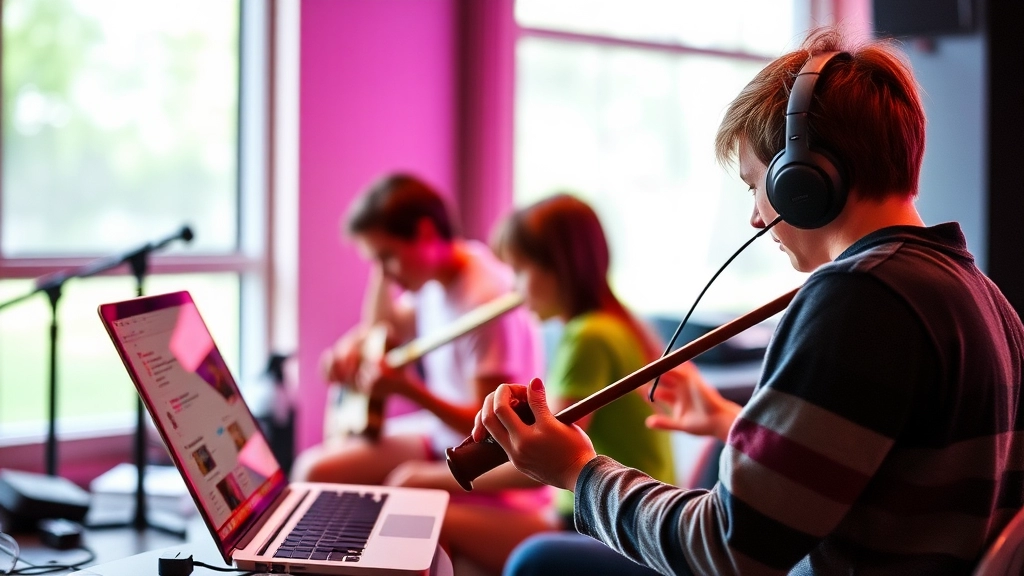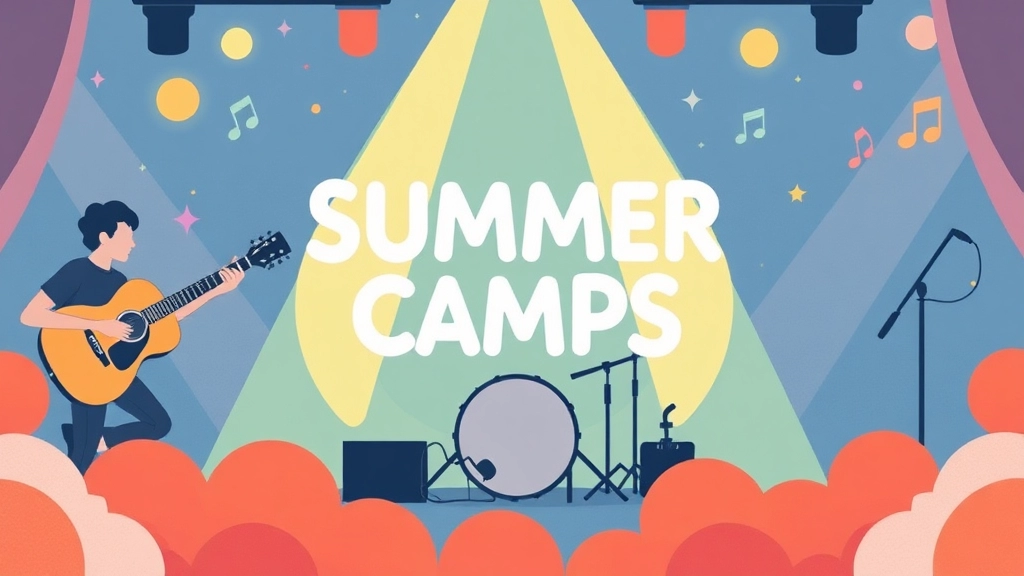Welcome to Summer Music Camps
Imagine a summer where your child not only learns to play an instrument but also gains confidence, makes new friends, and even dabbles in music production. Welcome to the world of summer music camps! From general music camps to specialized programs for budding DJs, there’s something for everyone. Whether you’re looking for day camps, overnight immersions, or online options, this guide will help you navigate the best choices for your young musician.
Types of Music Camps
We’ll explore the various types of music camps available, from age-specific programs to camps focused on specific instruments or skills. Discover how technology is integrated into music education with production and DJ camps. Learn the differences between camps for beginners and advanced musicians, and find out about performance opportunities that can turn practice into real-world experience.
Notable Camps and Selection Tips
Finally, get insights into notable camps like Berklee and Interlochen, and tips on selecting the right camp based on your child’s interests and goals. Let’s dive in!
Types of Music Camps Available
Alright, let’s dive into the world of music camps. You’re probably wondering, “What types of music camps are out there, and which one is the best fit for me or my kid?” Let’s break it down.
General Music Camps
These camps are like the Swiss Army knife of music camps. They cover a broad range of musical activities, from playing different instruments to learning music theory. Perfect for beginners who want to dip their toes into various aspects of music.
Instrument-Specific Camps
Got a kid who’s obsessed with the guitar, piano, or maybe the drums? Instrument-specific camps focus solely on one instrument. This is where they can hone their skills and get some serious practice time. Think of it as a boot camp for musicians.
Genre-Specific Camps
Is jazz your jam? Or maybe rock, classical, or even electronic music? Genre-specific camps cater to those who are passionate about a particular style of music. These camps often bring in genre experts to teach and inspire.
Performance-Based Camps
If performing on stage gets your adrenaline pumping, then performance-based camps are your playground. These camps focus on live performance skills, stage presence, and even the nitty-gritty of setting up a gig. It’s all about getting you ready to rock the stage.
Music Production Camps
Welcome to the future of music. Music production camps are for those who want to get behind the scenes and create magic with technology. Learn about recording, mixing, and producing tracks. Perfect for budding DJs and producers.
Music Therapy Camps
Music isn’t just about entertainment; it’s also a powerful tool for healing. Music therapy camps focus on using music to improve mental health and well-being. Ideal for those interested in the therapeutic side of music.
Specialty Camps
These are the unicorns of music camps. From songwriting retreats to camps focusing on music business and marketing, specialty camps cover niche areas. If you have a specific interest, there’s likely a camp for that.
Real Questions You Might Have
- “Is my child too young or too old for a music camp?”
- “What if they’re beginners?”
- “Can they focus on a specific instrument or genre?”
These are legit concerns, and we’ll tackle them in the next sections. Stay tuned!
Quick Recap
- General Music Camps: Broad range of activities.
- Instrument-Specific Camps: Focus on one instrument.
- Genre-Specific Camps: Dedicated to a particular style.
- Performance-Based Camps: All about live performance.
- Music Production Camps: Tech and production skills.
- Music Therapy Camps: Healing through music.
- Specialty Camps: Niche interests.
For those interested in a broader range of camp activities beyond music, check out the Summer Art Camps or dive into the world of Gaming Summer Camps to explore more unique and engaging opportunities.
Age-Specific Music Programs for Kids and Teens

Wondering if your child is too young or too old for music camp?
It’s a common worry.
But guess what? There are music camps tailored for every age group.
Kids’ Music Camps (Ages 5-12)
- Fun and Playful: Think lots of singing, dancing, and simple instruments.
- Beginner-Friendly: Perfect for those just dipping their toes into music.
- Interactive: Games and activities that make learning fun.
Teens’ Music Camps (Ages 13-18)
- Skill Development: Focus on honing specific skills, whether it’s guitar, drums, or vocals.
- Peer Collaboration: Teens get to jam and create music with others their age.
- Performance Opportunities: Many camps end with a concert or recital.
Why Age-Specific Matters
- Tailored Curriculum: Kids and teens learn differently. Camps designed for specific age groups ensure the right teaching methods.
- Social Interaction: Kids bond with peers their age, making the experience more enjoyable.
- Appropriate Challenges: Activities are suited to their developmental stage, keeping them engaged and motivated.
Real Talk: What Parents Worry About
- “Will my child fit in?” Age-specific camps ensure they’re with peers, easing social worries.
- “Is my teen too old to start?” Never. Many teens discover and excel in music later on.
Choosing the Right Camp
- Look for Age Groups: Check the camp’s website or call to confirm age-specific programs.
- Read Reviews: Other parents’ experiences can give you a good idea of what to expect.
- Ask Questions: Don’t hesitate to ask the camp organisers about their approach to different age groups.
Ready to find the perfect camp? Start by considering their age and interests.
Music Camps Focused on Specific Instruments or Skills
Alright, let’s cut to the chase. Ever wondered if there’s a music camp out there that zeroes in on exactly what you or your kid wants to master? You’re not alone. Tons of parents and budding musicians ask, “Is there a camp just for drummers, or violinists, or even vocalists?” The answer is a resounding yes. Music camps focused on specific instruments or skills are a game-changer for anyone looking to hone their craft.
Why Choose a Focused Music Camp?
Here’s the deal. General music camps are awesome, but if you want to get laser-focused on improving a specific skill or instrument, a specialised camp is the way to go. Think of it like this: you wouldn’t go to a general fitness class if you wanted to be a bodybuilder, right? Same concept here.
Benefits of Specialised Music Camps:
- Tailored Curriculum: These camps offer a curriculum that’s designed specifically for your instrument or skill. No more sitting through sessions that don’t apply to you.
- Expert Instructors: You get to learn from instructors who are specialists in your area of interest. These folks live and breathe your instrument.
- Like-Minded Peers: You’re surrounded by people who share your passion. This creates a focused and supportive learning environment.
- Intensive Practice: More time is spent on your instrument or skill, allowing for deeper learning and faster improvement.
Types of Specialised Music Camps
So, what kinds of specialised camps are out there? Let’s break it down:
Instrument-Specific Camps:
- Guitar Camps: Perfect for shredders and strummers alike. Think of camps like the National Guitar Workshop.
- Piano Camps: Ideal for classical pianists or those into jazz. Berklee and Interlochen have solid programs.
- Drum Camps: For those who want to keep the beat. Check out Drummers Collective.
- String Camps: Violin, viola, cello, you name it. These camps offer intensive training on string instruments.
Skill-Specific Camps:
- Songwriting Camps: If you’ve got a knack for lyrics and melodies, camps like Grammy Camp are where you should be.
- Vocal Camps: Focus on voice techniques, performance, and even recording.
- Jazz Camps: For those who want to dive deep into improvisation and jazz theory. Stanford Jazz Workshop is a top pick.
- Classical Music Camps: Perfect for those who want to focus on orchestral or solo classical music.
Real Stories, Real Impact
Let me share a quick story. I met a young guitarist, Jake, who attended a specialised guitar camp. He was just an average player before he went. But after a summer of intense, focused training, he came back shredding like a pro. His confidence skyrocketed, and he started his own band. That’s the kind of transformation a specialised camp can bring.
Key Takeaways
- Choose Wisely: Pick a camp that aligns with your instrument or skill to get the most out of it.
- Do Your Homework: Research the instructors and curriculum to ensure it meets your needs.
- Network: Use the opportunity to connect with like-minded peers and professionals.
For more information on various summer camps, check out our guide on top adventure summer camps for kids and teens and explore the ultimate guide to summer camp volleyball for those interested in sports.
Integrating Music and Technology: Production and DJ Camps

Ever wondered how to blend your love for music with cutting-edge tech?
Or maybe you’ve got a kid who dreams of being the next big DJ?
Production and DJ Camps are the perfect playground for that.
These camps are all about mixing beats and learning the ropes of music production.
Why Choose a Production or DJ Camp?
Let’s be honest.
Traditional music camps are great, but they might not cut it if you’re into the tech side of things.
Here’s why these camps rock:
- Hands-On Learning: You get to work with real DJ gear and production software.
- Expert Instructors: Learn from pros who know the industry inside out.
- Creative Freedom: Experiment with different styles and genres.
What Do You Learn?
It’s not just about spinning records.
You dive into the nitty-gritty of music production:
- Beat Making: Craft your own beats from scratch.
- Sound Engineering: Understand how to mix and master tracks.
- Live Performance: Get comfortable performing in front of a crowd.
Real Stories, Real Impact
Take Jamie, for instance.
He joined a DJ camp last summer.
He went from zero experience to spinning at his school’s dance party.
Now, he’s even thinking about a career in music production.
Day Camps vs. Overnight Camps
You’ve got options.
Day Camps:
- Perfect if you want to dip your toes in.
- Usually shorter, a week or two.
Overnight Camps:
- More immersive.
- You live and breathe music 24/7.
Online Options
Can’t make it to a physical camp?
No worries.
There are fantastic online music camps too:
- Virtual Workshops: Learn from the comfort of your home.
- Interactive Sessions: Real-time feedback from instructors.
Choosing the Right Camp
It boils down to what you want to achieve.
- For Beginners: Look for camps that cover the basics.
- For Advanced Learners: Opt for specialised camps that dive deeper.
So, whether you’re a newbie or a budding pro, there’s a production or DJ camp out there for you.
Music Camps for Beginners vs. Advanced Musicians
Ever wondered if a music camp is right for you or your child? Whether you’re just starting out or already shredding on your instrument, the right music camp can make a world of difference. Let’s break it down.
Why Choose a Music Camp?
Music camps can be a game-changer. They offer:
- Focused learning: Dive deep into your instrument or musical skill.
- Networking: Meet like-minded peers and mentors.
- Performance opportunities: Gain real-world experience.
But here’s the kicker: not all music camps are created equal. Some are designed for beginners, while others cater to advanced musicians. Picking the right one can be the difference between a transformative experience and a frustrating one.
Music Camps for Beginners
If you’re just starting out, you might be thinking, “Will I be able to keep up?” or “What if everyone else is way better than me?” Relax. Beginner camps are all about creating a supportive environment where you can learn the basics without feeling overwhelmed.
Key features of beginner camps:
- Fundamentals: Focus on basic techniques and theory.
- Group lessons: Learn alongside other newbies.
- Low-pressure performances: Build confidence without the stress.
Example: Imagine a 10-year-old who’s just picked up the guitar. At a beginner camp, they’d get to learn simple chords, play in a group, and maybe even perform a song by the end of the week. It’s all about building a solid foundation.
Music Camps for Advanced Musicians
On the flip side, if you’re already rocking it out, you need a camp that challenges you. Advanced camps are designed to push your limits and refine your skills.
Key features of advanced camps:
- Masterclasses: Learn from top professionals in the field.
- Intensive practice: Expect rigorous schedules.
- High-level performances: Showcase your talent in competitive settings.
Example: Think of a 16-year-old violinist aiming for a music conservatory. An advanced camp would offer intensive practice sessions, masterclasses with renowned musicians, and opportunities to perform complex pieces.
How to Choose the Right Camp
So, how do you decide which camp is right for you? Here are a few pointers:
- Assess your skill level: Be honest about where you’re at. It’s better to start in a beginner camp and build confidence than to struggle in an advanced one.
- Set your goals: What do you want to achieve? Whether it’s mastering a new skill or preparing for auditions, your goals will guide your choice.
- Research the camps: Look into the curriculum, instructors, and reviews. Make sure the camp aligns with your needs.
Pro tip: Many camps offer assessments or placement tests. Don’t shy away from theseâthey can help ensure you’re in the right spot.
Real Talk: What to Expect
For beginners: Expect a lot of hand-holding and encouragement. You’ll be surrounded by others who are just as new as you, making it a supportive environment.
For advanced musicians: Be ready to hustle. These camps are no joke and will push you to your limits. But the payoff? Unmatched growth and opportunities.
Ready to find the perfect camp? Check out our guide to the UNCG Summer Music Camp for key dates and programs. If you’re looking for a broader range of options, explore our top summer camps for teens that include adventure, STEM, and arts.
Performance Opportunities at Music Camps

Ever wondered if your kid will actually get to perform at a music camp?
Let’s dive into it.
Performance Opportunities: What to Expect
Music camps aren’t just about practising in a room.
They’re about getting up on stage and showing what you’ve got.
Here’s what you can expect:
- Recitals: Most camps end with a recital. It’s a chance for everyone to show off what they’ve learned.
- Band Performances: If your kid is into rock or jazz, they might get to play in a band. It’s a great way to learn teamwork.
- Solo Performances: Got a budding solo artist? Camps often have spots for solo acts.
- Ensembles: Think orchestras or choirs. These are perfect for kids who love classical music or singing.
Why Performances Matter
Performances aren’t just fun.
They teach valuable skills.
- Confidence: Getting on stage boosts self-esteem.
- Real-World Experience: It’s one thing to practise in your room. Performing in front of an audience is a whole different game.
- Feedback: Live performances often come with feedback sessions. This is gold for improving skills.
Stories from the Stage
I remember my first camp performance.
Nervous as hell.
But once I got through it, I felt like I could conquer the world.
And I’ve seen it happen with countless kids.
They start shy and end up owning the stage.
Day Camps vs. Overnight Camps: Performance Differences
Day camps usually have one big performance at the end.
Overnight camps?
You might get multiple chances to perform.
Think campfire sessions, talent shows, and more.
Online Music Camps: Do They Offer Performances?
You bet.
Virtual recitals are a thing now.
Kids perform from their living rooms, and it’s streamed to everyone.
Not the same as live, but still a great experience.
Choosing a Camp with the Best Performance Opportunities
When picking a camp, check their performance schedule.
- How many performances?
- What types?
- Are there opportunities for feedback?
This will help you find the right fit.
Day Camps vs. Overnight Music Camps
Ever wondered which type of music camp is right for you or your child? Choosing between day camps and overnight music camps can be a real head-scratcher. Let’s break it down and see what fits best with your goals and lifestyle.
Day Camps: The Daily Grind
Day camps are like your regular school day but way more fun. They’re perfect if you want to dip your toes into music without the commitment of an overnight stay. Here’s why you might choose a day camp:
- Convenience: You get to sleep in your own bed every night. No homesickness, no fuss.
- Routine: They usually run from early morning to late afternoon. You can still catch up with friends or family in the evening.
- Cost-Effective: Typically cheaper than overnight camps since you’re not paying for accommodation and meals.
- Local Vibe: Great if you want to connect with local musicians and teachers.
But hey, day camps aren’t all sunshine and rainbows. You might miss out on that immersive experience and the late-night jam sessions that overnight camps offer.
Overnight Camps: The Full Immersion
Now, if you’re ready to dive headfirst into the music world, overnight camps might be your jam. Here’s what they bring to the table:
- Total Immersion: You’re living and breathing music 24/7. It’s intense, but you’ll learn a ton.
- Networking: You’ll meet people from all over, not just your local area. This can lead to lifelong friendships and professional connections.
- Independence: Being away from home can boost your confidence and independence.
- Unique Experiences: From campfires to concerts, you’ll have stories to share for years.
However, overnight camps can be a bit pricier, and not everyone is comfortable being away from home for an extended period.
How to Decide?
Think about your goals and comfort level. Are you looking to just have fun and learn a bit, or are you aiming for a deep dive into music? Here’s a quick checklist to help you decide:
- Budget: What can you afford?
- Time Commitment: How much time are you willing to invest?
- Comfort Level: Are you okay with being away from home?
- Goals: What do you want to achieve? Just fun or serious skill-building?
In the end, whether it’s a day camp or an overnight camp, the key is to find what aligns with your interests and goals. Both offer unique experiences and can be incredibly rewarding.
If you’re considering day camps, check out the top free summer camps in San Diego for some great options. For those leaning towards overnight camps, the best summer overnight camps provide a comprehensive guide to help you choose the right one.
Online Music Camps and Remote Learning Options

Ever thought, “I want my kid to learn music, but how do I fit it into our crazy schedule?”
You’re not alone.
Online music camps are a game-changer for busy families.
They offer flexibility and top-notch instruction without the hassle of travelling.
Why Choose Online Music Camps?
Convenience: No need to drive anywhere. Your kid can learn from the comfort of home.
Flexibility: Classes can fit around your schedule, not the other way around.
Diverse Options: From guitar to DJing, there’s a camp for every interest.
What Can You Expect?
Here’s what you can typically expect from online music camps:
- Live Sessions: Real-time interaction with instructors.
- Recorded Lessons: Access to materials at any time.
- Interactive Platforms: Tools that make learning fun and engaging.
Pros and Cons
Pros:
- Accessibility: No geographical limitations.
- Affordability: Often cheaper than traditional camps.
- Variety: A wide range of subjects and skill levels.
Cons:
- Screen Time: More time in front of a screen.
- Less Social Interaction: Fewer chances to meet peers in person.
Popular Online Music Camps
Let’s break down a few notable ones:
- Berklee Online: World-renowned instructors and courses.
- Interlochen Online: High-quality programs in a virtual setting.
- School of Rock Remote: Practical and performance-based learning.
How to Choose the Right Online Camp
- Identify Interests: What does your child want to learn?
- Check Reviews: Look for feedback from other parents.
- Trial Classes: Some camps offer free trial sessions. Take advantage of these.
Real-Life Example
A friend of mine enrolled her daughter in an online piano camp last summer.
She was sceptical at first.
But by the end, her daughter was playing full songs and even performed in a virtual recital.
Notable Music Camps: Berklee, Interlochen, and School of Rock
Alright, let’s get real for a sec. You’re probably wondering, “Which music camp is actually worth my time and money?” I get it. There are tons of options out there, but three camps always seem to rise to the top: Berklee, Interlochen, and School of Rock. Let’s break these down so you know what you’re getting into.
Berklee College of Music
Berklee isn’t just a name; it’s a legacy. If you’re serious about music, you’ve definitely heard of Berklee. This camp is like the Harvard of music camps. It’s got everything from performance to production, jazz to rock, and even film scoring.
- Top-notch Faculty: Learn from the pros who’ve been there and done that.
- Diverse Programs: Whether you’re a beginner or a prodigy, there’s something for you.
- Networking: Rub elbows with future industry leaders.
Imagine telling your friends you spent the summer at Berklee. Yeah, it’s that cool.
Interlochen Center for the Arts
Next up is Interlochen. This camp is like stepping into a musical wonderland. Nestled in the woods of Michigan, Interlochen offers a serene environment that’s perfect for creativity.
- Holistic Approach: It’s not just about music; it’s about becoming a well-rounded artist.
- World-Class Facilities: From concert halls to recording studios, they’ve got it all.
- Community: You’ll meet people from all over the world who share your passion.
Interlochen is where you go to immerse yourself in the arts, make lifelong friends, and grow as a musician and a person.
School of Rock
Last but definitely not least is School of Rock. If you’ve got a rebellious streak and a love for rock ân’ roll, this is your jam.
- Hands-On Learning: Get on stage and rock out. It’s all about practical experience.
- Cool Instructors: Learn from musicians who are active in the industry.
- Performance Opportunities: Play gigs, join bands, and live the rock star life.
School of Rock is perfect if you want to skip the theory and dive straight into performing.
Choosing the Right Camp
So, how do you pick the right one? Here’s a quick breakdown:
- Berklee: If you’re looking to get serious about a career in music.
- Interlochen: If you want a holistic arts experience in a beautiful setting.
- School of Rock: If you want to get on stage and start performing ASAP.
For more information on other exciting camp options, check out our guide on summer camp essentials and our list of top summer camps in Memphis.
Selecting the Right Music Camp Based on Interests and Goals
Feeling overwhelmed by the sheer number of music camps out there?
You’re not alone.
Finding the right music camp can feel like hunting for a needle in a haystack.
But don’t worry, I’ve got your back.
Let’s break it down.
1. Know Your Interests
First off, what’s your kid into?
Are they obsessed with shredding on the guitar?
Or maybe they’re all about composing the next big symphony?
Different camps focus on different things:
- Instrument-Specific Camps: Perfect for those who want to master one instrument.
- Skill-Based Camps: Great for honing specific skills like songwriting or music production.
- Performance Camps: Ideal for those who love the spotlight and want to perform.
2. Assess Skill Level
Is your child a beginner or a seasoned pro?
Beginners should look for:
- Camps that offer foundational skills.
- Friendly environments that encourage learning without pressure.
Advanced musicians should consider:
- Camps that challenge their abilities.
- Opportunities to collaborate with other skilled musicians.
3. Think About the Experience
Does your child thrive in social settings or do they prefer one-on-one instruction?
Day Camps vs. Overnight Camps:
- Day Camps: Great for younger kids or those who prefer to stay close to home.
- Overnight Camps: Perfect for older kids who want a more immersive experience.
4. Explore Online Options
Not ready for in-person camps?
No problem.
Online music camps offer:
- Flexibility to learn from home.
- Access to top-notch instructors from anywhere in the world.
5. Check Out Notable Camps
Some camps have a stellar reputation.
Consider these big names:
- Berklee: Known for its rigorous curriculum and top-tier instructors.
- Interlochen: Offers a balanced mix of performance and skill-building.
- School of Rock: Focuses on modern music and performance.
6. Match Goals with Camp Offerings
What’s the end game?
Do you want your child to:
- Build confidence?
- Improve technical skills?
- Make new friends?
Choose a camp that aligns with these goals.
For more insights on how to make the most of your summer camp experience, check out our guide to summer camp culture and activities. And if you’re considering virtual options, our list of top summer camps with virtual tours might be just what you need.
FAQs on Summer Camps for Music
What age groups are music camps available for?
Music camps are available for various age groups, including kids (ages 5-12) and teens (ages 13-18). Each camp is tailored to meet the developmental and social needs of these specific age groups.
What activities are included in kids’ music camps?
Kids’ music camps often feature fun and playful activities such as singing, dancing, and playing simple instruments. These camps are beginner-friendly and include interactive games to make learning enjoyable.
What can teens expect from music camps?
Teens’ music camps focus on skill development, peer collaboration, and performance opportunities. They can hone specific skills like guitar, drums, or vocals and often participate in a final concert or recital.
Why is age-specific programming important in music camps?
Age-specific programming ensures that the curriculum is tailored to the learning styles of different age groups. It also promotes social interaction and provides appropriate challenges to keep participants engaged and motivated.
What if my child is worried about fitting in?
Age-specific camps help ease social worries by grouping children with peers of the same age, making it easier for them to bond and feel comfortable.
Are there music camps that integrate technology, like DJ and production camps?
Yes, there are music camps specifically focused on production and DJing. These camps offer hands-on learning with real DJ gear and production software, taught by industry experts.
What skills can be learned at production and DJ camps?
Participants can learn beat making, sound engineering, and live performance skills. These camps provide a creative environment to experiment with different styles and genres.
Are there performance opportunities at music camps?
Yes, most music camps offer various performance opportunities such as recitals, band performances, solo acts, and ensembles. These experiences help build confidence and provide real-world experience.
Do online music camps offer the same benefits as in-person camps?
Online music camps offer flexibility and accessibility, with live sessions, recorded lessons, and interactive platforms. While they may have less social interaction, they are often more affordable and accessible.
How do I choose the right music camp for my child?
Consider your child’s age, interests, and skill level. Look for camps that offer age-specific programs, read reviews, and ask the camp organizers about their approach. For online camps, check for trial classes and read feedback from other parents.
Can beginners join music camps, or are they only for advanced learners?
Many music camps cater to beginners, offering programs that cover the basics. There are also specialized camps for advanced learners who want to dive deeper into specific areas of music.
Are there day and overnight music camps, and how do they differ?
Yes, there are both day and overnight music camps. Day camps are usually shorter and perfect for those wanting to try out the experience, while overnight camps offer a more immersive experience, living and breathing music 24/7.
What are some popular online music camps?
Notable online music camps include Berklee Online, Interlochen Online, and School of Rock Remote. These camps offer high-quality programs and real-time interaction with instructors.

